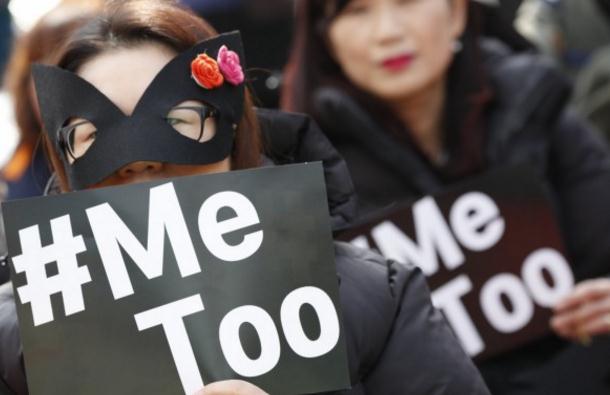A number of sexual assault cases in China have used the defence that women were wearing provocative clothing, How are young women using provocative clothing to fight back against this kind of victim-blaming?
Annie Chen is standing in front of her full-length mirror and putting on her black vest and hot pants which are her usual style of dressing. But she is stopped by her mom before she leaves home and is asked to change her outfit. She does so.
Annie and many other women in China are in an embarassing situation that it is impossible that they could wear provocative clothes without being judged by others. It is suggested by people close to them not to wear this for their own good because they are very likely to be blamed if they get sexually harassed.
“I don’t think wearing ordinary sexy clothes is inappropriate. The reason why I wear this is simply to show off my body strength. For example, my shoulder and neck line look good, so I like to wear Camisoles.” says Annie, who is a college undergraduate in US.
Women in provocative clothes are usually confident about their body and are willing to displaying their figures in public. Mudan, who is a college student in Shanghai is proud of her body shape and wearing provocative clothes for her is a way to show off.

“I like the appearance of my collarbone, my shoulder and my chest. The ups and downs are very beautiful, like oil paintings. Why don’t you show beautiful things?”
Mudan was criticized for her style of dressing by her family but she never compromised. Finally her mother admitted that she looks better in that dressing. For her, her outfit has no problem and sexual assault is not directly related to provocative clothes as well.
“My experience did not conform to the stereotypes. The harassment I encountered was when I wore more clothes. Those men maybe think I was an easy target, but now it does not happen anymore after I dress this way.” she says.
People tend to believe that a provocatively dressed woman has greater risks for sexual assault and consequently bear slut-shaming if she is attacked. In other words, the victim could be blame for her dressing after getting assault.
In 2018, several cases about sexual harassment by dirvers working for China’s largest taxi hailing service provider Didi were reported. Two female passengers were even murdered by drivers which caused huge outcry in China. In the meantime, comments below the news that blame it on victims because of their outfits emerged. During that period, Women are even suggested by some regional Public Security not to wear provocative clothes when communiting to avoid sexual assault and keep safe.

The “common sense” worldwide that women put themselves at a risk due to the way they dress, is a part of slut-shame. But not everyone realizes that.
Outside of China, American fashion designer Donna Karan once told the Daily Mail in 2017:“Look at everything all over the world today and how women are dressing and what they are asking by just presenting themselves the way they do.What are they asking for? Trouble.”
But the implication that what you wear causes sexual assault or even rape proves wrong in an exhibit in Belgium. The theme of the exhibit at the Centre Communautaire Maritime in Brussels is called, “What were you wearing?” It features replicated clothing items similar to those worn by victims of sexual assault including pajamas, tracksuits. The exhibit proves that clothing does not justify sexual violence. As a result, the victims should not be blamed for their dressing as well.
When it comes to China, the topic around women’s provocatively dressing was brought up from time to time but did not gain much attention until one day in 2019.
In 2019 June 12th, an article titled “Wish all the Chinese woman have freedom to dress” went viral in Wechat public accounts platform. The author believes women should not get permission from anyone for dressing, including their partners. In response to that, hashtags like “freedom to dress” “”“Wish all the Chinese woman have freedom to dress” became trending topics, following on upon with that. Many women posted their pictures in different clothes styles using the hashtag.
The term “freedom to dress “ became a buzzword during that period in China. Up to now, it is still a hot topic that is often discussed. The page view of the topic “freedom to dress” “Wish all the Chinese woman have freedom to dress” both have reached over five million. But for people who hold conservative views about dressing, the freedom does exist but it is limited.
For Mudan’s mother, wearing provocative clothes in her provincial hometown makes her feel ashamed. “I feel like the freedom is a relatively social issue because the tolerance in each city is different. In my hometown, ”Mudan says.“if you exceed the limit, everyone will think you are insane. ”
“But in fact, freedom is something that cannot be restrained as long as it does not hurt anyone. Who ever thinks freedom should be limited should not talk about freedom.” She adds.
Woman in provocative clothes are faced with various judgments. Except for slut-shaming, they are questioned about whether they dress for themselves or to satisfy the Male gaze,which is to objectify or sexualize women from men viewers.
Holly Xue, a part-time documentary maker, has made a film about private photographs and the male gaze. Holly believes that how to get rid of male gaze and control women’s own bodies depends on whether the act of dressing is based on their pleasure, comfort, beauty rather than catering to the norms of male gaze.

Although many women deny that they dress for the male gaze, they could not really justify themselves. Except for the women themselves, nobody could tell the intention of their dressing.
For those women, sexual assault by gazing is not specific enough to be evidence of sexual assault, and it is hard to avoid attention in public.
“I think women who always feel free to dress usually reject and ignore of others’ scrutiny. But in the current environment in China, I think it is difficult for women to escape from this ubiquitous discipline.” Tu, who is a journalist and also a feminist says.
Quite a few people believe that the freedom to dress and the freedom of gazing should co-exist. Consequently, it is hard to regulate the “male gaze” in public occasions and make sure women could escape from unnecessary attention.
In order to resist male gaze and fight for women’s freedom to dress, an online campaign outside China started. Days ago, woman started using the hashtag FreeYourNipples on TikTok to show that women should not be feel ashamed when revealing the nipples.
Around the same time, a Chinese girl posted a photo of herself in a shirt without wearing a bra in her friend circle received plenty of critics and abuse and she was blocked by some of her friends as well. Although she claims it is only a test to find out the reactions about her challenging the traditional aesthetics, majority of people thinks it is an aggressive and rude act.
The discussion about the tolerance of woman’s dressing in different culture background was brought up again. From the perspective of culture, the overall culture in China tend to be more conservative and traditional while the culture of the west is more open and liberate.
It seems like it is the culture background that causes the different result of two sides. In Chinese culture, nipples are usually seen only as sexual parts of woman and sex is still something people don’t talk about aloud.
“Chinese people’s perception of nipples may still be related to sex, and can’t think of the liberation of female bodies.” Holly says.
Mudan thinks sex is what people need to talk about if they want freedom to dress. She says: “In my values, compared to the capitalists’ advocacy of childbirth policy, pure sex is so innocent. Sex is either currency or a tool of exchange interests for most people in China, that’s why they feel ashamed.”
But, despite all this, Tu thinks culture difference should not be the only reason that explains the different result. She says: “These two isolated examples are not enough to draw a conclusion about cultural differences. There are also conservatives in Western countries. Body anxiety and slut-shame do not only happen in China. It is a bit rough to conclude it with geographical location, it should be based on the specific context of the environment instead.
“I don’t like wearing bras, so now I choose to wear pastie. Sometimes I feel a little embarrassed if I forget to wear them. I think for most women, the freedom to dress does not comes from certain people, but from the cultural atmosphere of their life and maybe a particular environment. I think if I worked in a feminist organization in a western country, there would be no such embarrassing moment.” says Tu.

It explains why some girls tend to dress no- bras abroad but remain wearing bras at home. This kind of occasion usually happens to the oversea students.
Shawnee, a student from Sheffield, feel restrained when coming back to China. “I have been not wearing bras for months without worrying about others’ judgments but now I need to consider if it is appropriate in China.” says Shawnee.
The topic to not wear bras is closely connected with feminist movements these years. Some feminist influencers therefore call on women not to wear bras for women’s welfare and see the act of not wearing bras as sign of freeing women’s bodies.
“Freedom to not wear bras is good as it is part of human rights. With social norms oppressing women today, women would have to take actions to rebel.” Mudan says.
But this kind of statement is accused of being irrational for not considering about the Physiological condition.
“I feel that not wearing bra is too much. In fact, not wearing bra would harm our breast.” Annie says.
Public opnions towards the movement to no wear bras have polarized. For some women, it is an meaningful and inspiring act while to some people it is impractical. This movement also shows the current situation of feminism development in China.
For Gabrielle, she find that the problem of Chinese feminist is that there is no organization and no good leader to guide.
She says:“I should say it is like a heap of loose sand. Women are not united together like men. Some women even oppress women in another way.”
Although the current situation for feminists is a mess, it is gradually developing and an increasing number of women start to focus on the women’ s issue.
Unlike the previous two generations of feminists, the young feminists have a special way to voice. The Internet has become their main place for voices and feminist tend to start online campaign. To be specific, they would use trending hashtags in social media about women to expand the influence.
Besides, they also would perform in public places and use performance art in order to attract public attention.
For example, in the Shanghai subway in 2012, young women held slogans “I can harass, you can’t harass!” to oppose subway sexual harassment. The “Occupy Men’s Toilet” campaign carried out in major cities in order to make people known that it is short of lady’s toilets in public places. They also shaved their heads in protest against the unequal admission of men and women in college entrance examinations..
In recent years, the Guangzhou Gender Center released the “Survey on Sexual Harassment among Chinese Universities and Graduates” in 2017 and the #Metoo movement that has swept across Chinese universities and the workplace has also struggled to promote gender equality.

But in general, the development of feminism in modern China is still at the immature stage. For Annie, the domestic feminist movement can be said to be a pot of water heating, but it is far from reaching the boiling point. Women slowly began to have feminist awareness.
Wang Zheng says:“In the context of today’s global feminist movement, the special challenges encountered by Chinese local feminist require our continuing attention. The young generation has a long way to go, and all Chinese with conscience should support rather than suppress young feminists. Suppressing feminism and stigmatizing feminism is a betrayal of the predecessors of the feminist revolution.
“China needs to continuously reform the patriarchal culture, break the stereotypes and make innovation in the system, and learn from advanced countries in the field of gender equality. In this way, the country could move forward more smoothly in this field.”








